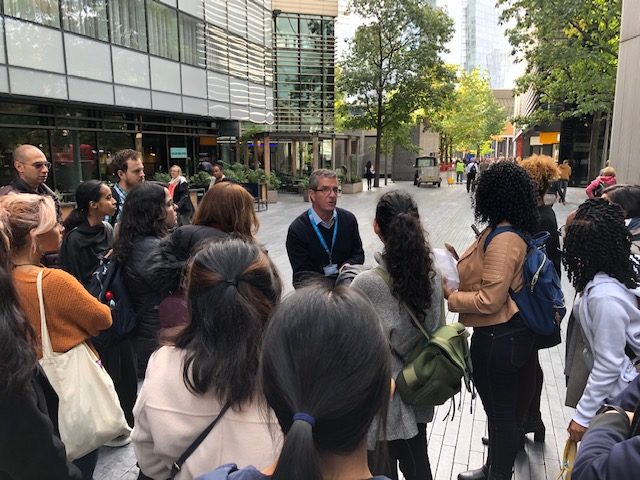Ellie Warr is a full-time student on the Birkbeck and RADA Text & Performance MA. She is currently collaborating with members of the T&P course to develop a new show inspired by the offshore bars established by the LGBTQ+ community of New Orleans. She writes here about Professor Gill Perry’s lecture Floating Islands In Contemporary Art, and was drawn to the event by the promise of different perspectives on the way that islands, and the themes of exile and identity, interact.

Floating plastic waste … a trash island in the making
The lecture took place in the cinema at 43 Gordon Square, which allowed Visiting Professor Gill Perry to share large images of the work of Alex Hartley, Robert Smithson and Andrea Zittel with her audience. ‘Floating islands’ is a sub-category of the subject of Perry’s forthcoming publication, Islands in Contemporary Art, and the lecture provided an opportunity for Perry to work through some of the issues that she was encountering in her research, including the scarcity of women artists creating work in the topic.
Coverage of floating islands in literature is abundant, Perry argued, while in the visual arts the subject is a lot less busy. Perry is thinking specifically of 18th and 19th century science and fantasy fiction, such as Jules Verne’s, The Floating Island, in which a propeller-powered, aristocrat-laden mobile island tours the Pacific Ocean. For contemporary visual artists, the idea of the floating island is pertinent to critical ideas such as migration and ‘post-Brexit fantasies of our separate island status’.
Global warming was the direct cause of Alex Hartley’s ‘Now Here is Land’, an island in the high arctic region of Svalbard that Hartley ‘discovered’ in 2004. Now Here is Land (also pronounced ‘no where island’) was revealed as a result of glacial retreat and claimed by Hartley in a satire of colonial statement. After securing a commission from the Arts Council as part of the 2012 Cultural Olympiad, Hartley won his appeal for the island’s independence and tugged a piece the size of a football pitch around the south west coast of England. His ‘new nation for a complicated world’ ornamented, or ‘disfigured’, the seaside snaps of holidayers from Weymouth to Bristol, many of whom became citizens via the island’s mobile embassy. 23,003 signed up in total, and were ‘rewarded’ for their global spirit by receiving a chunk of the island once the tour was done.
The commission was a subversive element of the Cultural Olympiad and Perry wryly commented that Hartley does not think the idea would receive funding if proposed today. As an anti-nation state, Now Here is Land pokes at the resurgence of the nation-state in recent years. Perry juxtaposed the island with the more easily recognisable Orbit, the 114.5-metre-high sculpture by Sir Anish Kapoor that has reshaped the East London landscape and exemplifies the ‘hubristic masculinity’ that Perry also recognises in Christo’s forthcoming Mastaba, a huge floating installation piece coming to the Serpentine this summer.
In contrast, Perry argued, Hartley’s work is more in keeping with the potentially ‘naive’ works of Lucy and Jorge Orta, whose Antarctica Project (2007) featured a series of tents decorated with flags from around the world recalling the temporary accommodation of refugees fleeing military and social conflict. Like Hartley, the Orta’s mimicked the processes by which nationhood is constructed, distributing the Antarctica World Passport, ‘which included a proposal to ratify the UN Declaration of Human Rights: Article 13.3. Everyone has the right to move freely and cross-frontiers to their chosen territory. No individual should have an inferior status to that of capital, trade, telecommunication, or pollution that traverse all borders.’ Perry emphasised the way that contemporary artists invoke symbolic citizenship as a form of political activism; acts of collective power that are exempt from the 21st century ideals of individualism and isolation that the island motif offers.
Perry opened the floor to questions towards the end of the session, inviting her audience to comment on the wide-ranging nature of her research so far. One of the issues of the subcategory of floating islands, Perry explained, was in constructing a justifying criteria. However, while the international campaign to recognise the Trash Isles, the island of plastic floating in the Pacific, as an official country continues to raise awareness about the critical issues of the contemporary, I think Perry’s efforts will remain highly relevant.










